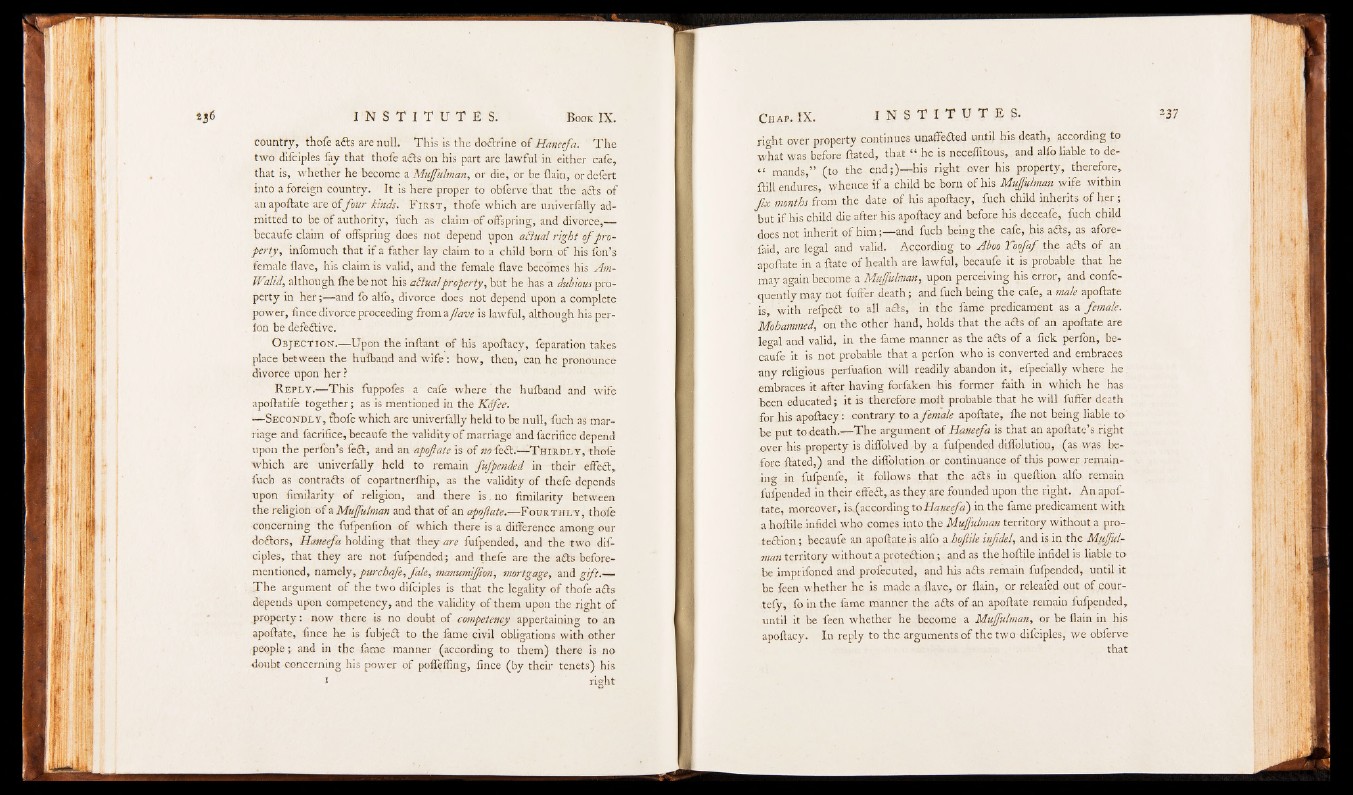
country, thofe adds are null. This is the dodbrine of Haneefa. The
two difciples fay that thofe adds on his part are lawful in either cafe,
that is, whether he become a Mujfulman, or die, or be llain, or defert
into a foreign country. It is here proper to obferve'that the acts of
an apoftate are offour kinds. F irst, thofe which are univerlally admitted
to be of authority, luch as claim of offspring, and divorce,—
becaufe claim of offspring does not depend upon actual right o f property,
infomuch that if a father lay claim to a child born of his fon’s
female Have, his claim is valid, and the female Have becomes his Am-
Walid, although fhe be not his attualproperty, but he has a dubious property
in her;— and fo alfo, divorce does not depend upon a complete
power, fince divorce proceeding fromayfew is lawful, although his per-
lon be defective.
Objection.—Upon the inftant of his apoftacy, feparation takes
place between the hufband and wife : how, then, can he pronounce
divorce upon her ?
Reply.— This fuppofes a cafe where the hufband and wife
apoftatife together; as is mentioned in the Kafee.
—Secondly, fhofe which are univerfally held to be null, fuch as marriage
and facrifice, becaufe the validity of marriage and facrifice depend
upon the perfon’s feet, and an apojiate is of no fedd.-—T hirdly, thofe
which are univerfally held to remain fufpended in their effect,
fuch as contrails of copartnerfhip, as the validity of thefe depends
upon fimilarity of religion, and there is . no fimilarity between
the religion of a Mujfulman and that of an apojiate.— Fourthly, thofe
concerning the fufpenfion of which there is a difference among our
doftors, Haneefa holding that they are fufpended, and the two difciples,
that they are not fufpended; and thefe are the adds before-
mentioned, namely, pur chafe, fale, manumijfon, mortgage, and g ift.—
The argument of the two difciples is that the legality of thofe aits
depends upon competency, and the validity of them upon the right of
property: now there is no doubt of competency appertaining to an
apoftate, fince he is fubjedd to the fame civil obligations with other
people; and in the fame manner (according to them) there is no
doubt concerning his power of poflefling, iince (by their tenets) his
i right
ri°-ht over property continues un&ffedded until his death, according to
what was before ftated, that “ he is neceflitous, and alfo liable to de-
“ mands,” (to the .end;)— his right over his property, therefore,
ftill endures, whence i f a child be born of his Mujfulman wife within
fix months from the date of his apoftacy, fuch child inherit? of her ;
but if his child die after his apoftacy and before his deceafe, fuch child
does not inherit of him;— and fuch being the cafe, his acts, as afore-
faid, are legal and valid. According to Aboo Tocfaf the adds of an
apoftate in a ftate of health are lawful, becaufe it is probable that he
may again become a Mujfulman, upon perceiving his error, and confe-
quently may not fuffer death; and fuch being the cafe, a male apoftate
is, with refpedt to all acts, in the fame predicament as a female.
Mohammed, on the other hand, holds that the adds of an apoftate are
leval and valid, in the fame manner as the adds of a fick perfon, becaufe
it is not probable that a perfon who is converted and embraces
any religious perfuafion will readily abandon it, efpecially where h e ,
embraces it after having forfaken his former faith in which he has
been educated; it is therefore moft probable that he will fuffer death
for his apoftacy: contrary to a female apoftate, (he not being liable to'
be put to death.— The argument of Haneefa is that an apoftate’s .right
over his property is diffolved by a fufpended dilTolution, (as was before
ftated,) and the diflolution or continuance of this power remaining
in fufpenfe, it follows that the adds in queftion alfo remain
fufpended in their effedd, as they are founded upon the right. An apoftate,
moreover, is,(according toHaneefa) in the fame predicament with
a hoftile infidel who comes into the Mujfulman territory without a pro-
tedtion; becaufe an apoftateas alfo zhojlrie infidel, and is in the Myjfitl.-
man territory without a proteddion; and as the hoftile infidel is liable to
be imprifoned and profecuted, and his adds .remain fufpended, until it
be feen whether he is made a Have, or flain, or releafed out of cour-
tefy, fo in the fame manner the adds of an apoftate remain fufpended,
until it be feen whether he become a Mujfulman, or be flain in hjs
apoftacy. In reply to the arguments of the two difciples, we obferve
that